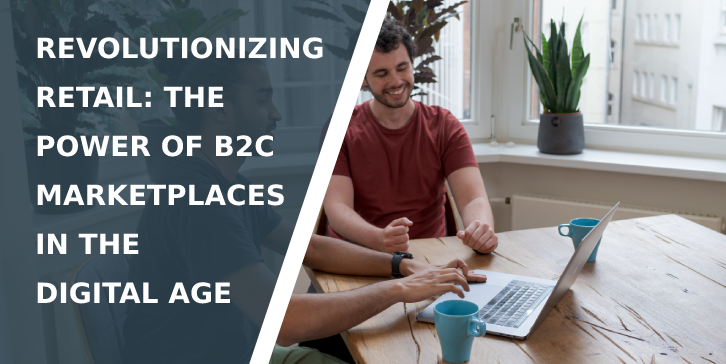Grasping the Transformation: B2C Marketplaces Ascending
Just as the Industrial Revolution ushered in a new era of commerce, the digital age has given birth to a seismic shift in the way we buy and sell goods. In this e-commerce tsunami, business-to-consumer (B2C) marketplaces ride the crest of the wave. A B2C marketplace is an online platform where multiple sellers offer their goods or services to consumers. The marketplace operator manages the platform, leaving vendors free to focus on what they do best: crafting superior products.

Meet the Market Movers: Titans of B2C Landscape
The United States leads the charge in this realm, with household names like Amazon, eBay, and Etsy setting the pace. These titans offer consumers a vast array of products at competitive prices, all from the convenience of their home, or even on the move.
Double-Edged Sword: Boons for Buyers and Sellers

Consumer Delight: The Charm of Choices
The appeal for consumers is self-evident. B2C marketplaces offer an unparalleled selection of goods, allowing customers to compare prices and features at a glance. They provide a one-stop-shop experience, saving consumers time and energy.
The Business Boost: Expanding Horizons and Streamlining Operations
For businesses, these platforms offer exposure to a vast customer base, extending their reach beyond geographical limitations. They streamline logistics and order fulfillment, leaving businesses to focus on product development and customer service. Small and medium-sized enterprises (SMEs), in particular, stand to benefit from the level playing field these platforms provide.
Rising to the Challenge: Overcoming Hurdles in B2C Marketplaces
Finding Your Unique Voice: Differentiation Amid Competition
Despite their apparent advantages, B2C marketplaces also present challenges. Chief among these is the fierce competition. Sellers must strive to differentiate their products and services to stand out from the crowd.
Winning Consumer Trust: Safeguarding Security and Ensuring Compliance
Another major concern is building trust with consumers, ensuring that transactions are secure and privacy is respected. Balancing seller autonomy with marketplace regulations is another tightrope that businesses must walk.
The Future Beckons: Emerging Trends and Innovations
Personalized AI Integration: Crafting Tailor-Made Shopping Experiences
In response to these challenges, B2C marketplaces are constantly innovating. Artificial Intelligence (AI) has been leveraged to offer personalized recommendations, providing customers with a bespoke shopping experience.
Mobile Commerce: Shopping at Your Fingertips
Mobile commerce is on the rise, with more and more consumers shopping via smartphone apps. This trend has led to the growth of app-based marketplaces that offer convenience and portability.
Social Commerce: Leverage Influencer-Driven Sales
Social commerce, where purchases are made within social media platforms, is another burgeoning trend. Influencer-driven sales offer another avenue for businesses to reach their target audience.
From Vision to Victory: Case Studies in B2C Success
Amazon: An Online Odyssey
Amazon’s journey from an online bookstore to a global marketplace giant is a testament to the potential of B2C marketplaces. It has revolutionized retail, offering a mind-boggling array of products across all conceivable categories.
Alibaba: E-Commerce Revolution in the East
Similarly, Alibaba has rewritten the rules of commerce in China. Its B2C platform, Tmall, hosts thousands of renowned brands, reaching millions of consumers daily.
Etsy: A Creative Corner for Artisans
Etsy offers a vibrant example of a specialized B2C marketplace. It provides a platform for artisans and creative entrepreneurs, allowing them to reach a global audience with their unique, handmade products.
Leveraging Data Analytics: Unearthing Hidden Insights
Data analytics has proven to be a game-changer in the realm of B2C marketplaces. In this ocean of transactions, each interaction leaves a data point, each data point a potential insight. From predicting consumer behavior to optimizing inventory, data analytics empowers businesses to make informed decisions. A skilled data analyst is essential in unlocking these insights, enabling businesses to navigate the complexities of data and extract valuable information for strategic decision-making and sustainable growth.
The Predictive Power: Forecasting Consumer Behavior
By analyzing purchase histories and browsing patterns, businesses can predict future consumer behavior. This enables them to tailor their offerings, personalizing the shopping experience and enhancing customer retention.
Inventory Optimization: Striking the Right Balance
Data analytics also aids in inventory management. By monitoring sales trends, businesses can predict demand and plan their inventory accordingly. This ensures they neither miss out on sales due to stock-outs nor incur costs due to excess inventory. For boutique owners seeking to refine their inventory selection, leveraging data analytics can provide valuable insights into trends and preferences, helping them make informed decisions on where to buy boutique inventory.
Navigating the Path to Sustainability: Greening Your Business
In an era of increasing environmental consciousness, sustainability is no longer an optional add-on, but a business imperative. B2C marketplaces present unique opportunities for businesses to embrace sustainability.
Sustainable Packaging: Minimizing Your Footprint
One significant way businesses can make a difference is through sustainable packaging. By using materials that are recyclable, biodegradable, or made from renewable sources, businesses can reduce their environmental footprint.
Responsible Sourcing: Promoting Fair Trade and Ethical Practices
B2C marketplaces can also promote responsible sourcing. By choosing to work with suppliers who adhere to fair trade practices and uphold labor rights, businesses can make a positive impact.
In conclusion, data analytics and sustainability are two potent tools for businesses in the B2C marketplace arena. By leveraging these effectively, businesses can not only enhance their profitability but also contribute positively to society. They are set to play a pivotal role in shaping the future of retail in the digital age. With these tools in hand, the possibilities are truly endless for B2C marketplaces in the United States and beyond.





Comments are closed.